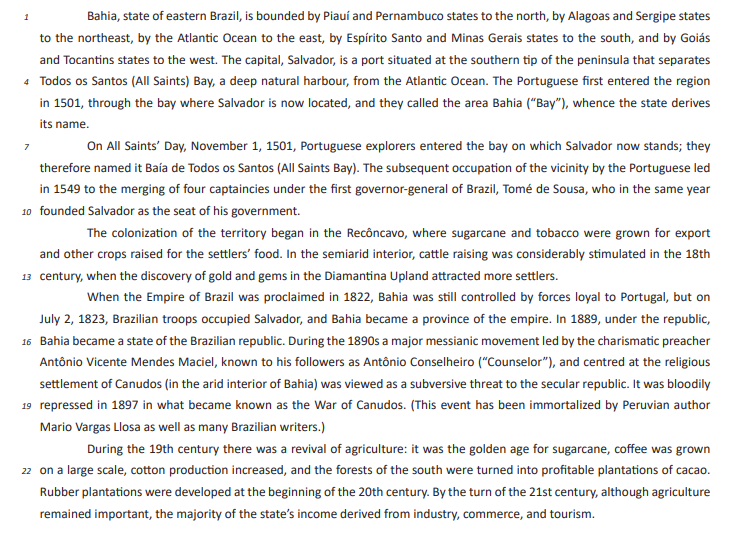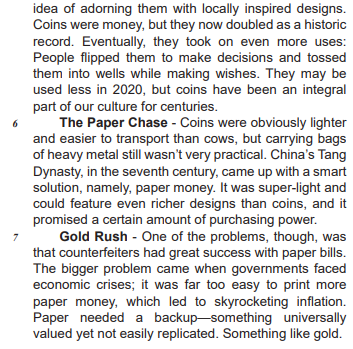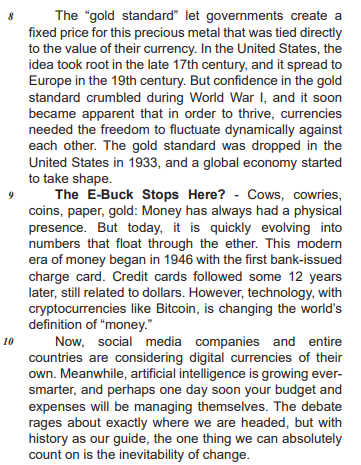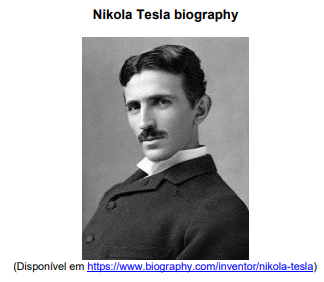Questões de Concurso
Sobre análise sintática | syntax parsing em inglês
Foram encontradas 259 questões

Internet: <www.britannica.com> (with adaptations).
In the construction “whence the state derives its name.” (lines 5 and 6) “whence” means from where and its is a possessive adjective related to “the state”.

Internet: <www.britannica.com> (with adaptations).
The construction “When the Empire of Brazil was proclaimed in 1822, Bahia was still controlled by forces loyal to Portugal” (line 14) can be correctly rewritten as Bahia was still controlled by forces that were loyal to Portugal when, in 1822, the Empire of Brazil was proclaimed.


What is the grammatical function of "me" in the opening sentence of Herman Melville's novel "Moby Dick"?
Text III

Alice Walker (born February 9, 1944), an American novelist, short story writer, poet,
and social activist (https://en.wikipedia.org/wiki/Alice_Walker)
We Alone
We alone can devalue gold
by not caring
if it falls or rises
in the marketplace.
Wherever there is gold
there is a chain, you know,
and if your chain
is gold
so much the worse
for you.
Feathers, shells
and sea-shaped stones
are all as rare.
This could be our revolution:
to love what is plentiful
as much as
what's scarce.
From: https://www.poetrysoup.com/famous/poem/we_alone_23191
Text 2 – Computers
(Text adapted from History of Computing. Retrieved from
https://www.cs.utexas.edu/~mitra/csFall2006/cs 303/lectures/history.html)
When you hear the term computers, it’s difficult to
imagine different devices from a laptop or a small
desktop. Believe it or not, they weren’t always like
they are today. They used to be very large and
heavy, sometimes as big as an entire room. Some
technology professors historically define computers,
as “a device that can help with computations”. The
word computation involves counting, calculating,
adding, subtracting, etc. The modern definition of a
computer is a little wider, because in our day and
age, computers store, compile, analyze and
compute an enormous amount of information.
Ancient computers were very interesting. Actually,
the first computer may have been located in Great
Britain, at Stonehenge. It is a man-made circle of
large stones. Citizens used it to measure the
weather and forecast the change of seasons. Some
specialists say that another ancient computer is the
abacus. It was used by the early Romans, Greeks,
and Egyptians to count and calculate. Even though
they are no longer in use, certainly, these early
devices are fascinating. Computers are embedded
in our history and some people say that we are
completely dependent of them. No matter the
complexity of the task, easy or difficult, some people
can’t do anything without them. Do you contest or
share this opinion?
Read the following exchange between two people having breakfast together.
A – Coffee?
B – Please.
A – Milk? Sugar?
B – No milk. One sugar, thanks.
A – Toast?
B – No thanks.
A – Juice?
B – Mmm.
(Thornbury, 2005, p. 3)
After reading the dialogue, choose the item that DOES NOT describe a correct reflection about grammar.
Considering language and background to language learning and teaching, match the topic to its definition.
( 1 ) Grammar ( 2 ) Lexis ( 3 ) Phonology ( 4 ) Function
( ) is the study of the sound features used in a language to communicate meaning. ( ) is a reason why we communicate. ( ) describes how we combine, organize and change words and parts of words to make meaning. ( ) is individual words or sets of words that have a specific meaning.
Choose the item with the CORRECT sequence.



Available at: https://www.synchronybank.com/blog/brief-history-of-money/. Retrieved on: Sept 10, 2022. Adapted.
Leia o texto para responder a questão.
English as a Lingua Franca
A number of researchers have studied conversations in English as a Lingua Franca and have noted a number of somewhat surprising characteristics, including:
• Non-use of third person present simple tense -s (She look very sad).
• Interchangeable use of the relative pronouns who and which (a book who, a boy which).
• Omission of articles where they are mandatory in native-speaker English.
• Increasing of redundancy by adding “inexistent” prepositions (We have to study about…, The article treats of…).
• Pluralisation of nouns which are considered uncountable in native-speaker English (informations, staffs).
The evidence suggests that non-native speakers are not conforming to a native English standard. Indeed they seem to get along perfectly well despite the fact that they miss things out and put things in which they ‘should not do’. Not only this, but they are actually better at ‘accommodating’ - that is, negotiating shared meaning through helping each other in a more cooperative way - than, it is suggested, native speakers are when talking to second language speakers (Jenkins 2004). In other words, non-native speakers seem to be better at ELF communication than native speakers are.
(Jeremy Harmer, The practice of English language teaching. Adaptado)
Text I
Trust and audit
Trust is what auditors sell. They review the accuracy, adequacy or propriety of other people’s work. Financial statement audits are prepared for the owners of a company and presented publically to provide assurance to the market and the wider public. Public service audits are presented to governing bodies and, in some cases, directly to parliament.
It is the independent scepticism of the auditor that allows shareholders and the public to be confident that they are being given a true and fair account of the organisation in question. The auditor’s signature pledges his or her reputational capital so that the audited body’s public statements can be trusted. […]
Given the fundamental importance of trust, should auditors not then feel immensely valuable in the context of declining trust? Not so. Among our interviewees, a consensus emerged that the audit profession is under-producing trust at a critical time. One aspect of the problem is the quietness of audit: it is a profession that literally goes about its work behind the scenes. The face and processes of the auditor are rarely seen in the organisations they scrutinise, and relatively rarely in the outside world. Yet, if we listen to the mounting evidence of the importance of social capital, we know that frequent and reliable contacts between groups are important to strengthening and expanding trust.
So what can be done? Our research suggests that more frequent dialogue with audit committees and a more ambitious outward facing role for the sector’s leadership would be welcome. But we think more is needed. Audit for the 21st century should be understood and designed as primarily a confidence building process within the audited organisation and across its stakeholders. If the audit is a way of ensuring the client’s accountability, much more needs to be done to make the audit itself exemplary in its openness and inclusiveness.
Instead of an audit report being a trust-producing product, the audit process could become a trust-producing practice in which the auditor uses his or her position as a trusted intermediary to broker rigorous learning across all dimensions of the organisation and its stakeholders. The views of investors, staff, suppliers and customers could routinely be considered, as could questions from the general public; online technologies offer numerous opportunities to inform, involve and invite.
From being a service that consists almost exclusively of external investigation by a warranted professional, auditing needs to become more co-productive, with the auditor’s role expanding to include that of an expert convenor who is willing to share the tools of enquiry. Audit could move from ‘black box’ to ‘glass box’.
But the profession will still struggle to secure trust unless it can stake a stronger claim to supporting improvement. Does it increase the economic, social or environmental value of the organisations it reviews? It is one thing to believe in the accuracy of a financial statement audit, but it is another thing to believe in its utility.
Adapted from: https://auditfutures.net/pdf/AuditFutures-RSA-EnlighteningProfessions.pdf
Sign the object in the sentence below.
Your uncle left a message.
Grupo nominal: “the alternating-current electric system”
I. o núcleo do grupo nominal é a palavra “system”. II. o grupo nominal tem dois núcleos “alternating” e “current” III. o fragmento em análise não é um grupo nominal, pois não há verbo.
Leia o texto 1 para responder a questão que se segue.

I. explicativo, pois constata onde ele nasceu. II. argumentativo, pois discute o lugar de nascimento dele. III. temporal, pois marca o tempo cronológico em que ele nasceu.
Instruction: Answer to questions 38 to 47 based on the text below. The Highlights throughout the text are cited in the questions.
Caribou
01 ____Large hoofed animals belonging to the deer family, caribou and reindeer are actually the
02 same species — Rangifer tarandus. There are differences between caribou and reindeer though.
03 Caribou are native to North America, whereas reindeer are native to northern Europe and Asia.
04 Alaska does have some reindeer, however, imported from Siberia in the late 19th and early 20th
05 centuries.
06 ____Some people use the term "reindeer" to refer to domesticated work animals, such as those
07 pulling Santa's sleigh, but there are both wild and domestic herds of reindeer. Caribou, on the
08 other hand, are wild-living and long-migrating. Indigenous groups herd reindeer and use them for
09 their meat. That's also likely why reindeer evolved to be stockier than caribou.
10 ____Caribou make one of the world's great large-animal migrations. As summer approaches,
11 they head north along well-trod annual routes. Some herds may travel more than 600 miles to
12 get to their summer grazing grounds. They'll spend the summer months feeding on the abundant
13 grasses and plants of the tundra. This is also when they give birth. When the first snows fall each
14 year, the caribou turn back south. Herds of female caribou, called cows, leave several weeks
15 before the males, which follow with yearling calves from the previous birthing season.
16 ____They are taller and lankier than reindeer, likely because they evolved to make these long
17 migrations. They are the only deer in which males and females both have antlers—though only
18 some females have them. Cows have one calf each year, which can stand after only a few minutes
19 and move on with its mother by the next day.
20 ____Caribou are classified as vulnerable to extinction, one step above endangered. Because
21 they're migratory, changes in the landscape, such as the appearance of new fences or other
22 human development on their migration routes, can be especially disruptive. Climate change is
23 also a threat. As the Arctic warms, they become more susceptible to diseases and parasites,
24 which could quickly spread through a herd.
(Available in: https://www.nationalgeographic.com/animals/mammals/facts/caribou – text adapted especially
for this test).
Why is there a hyphen in “large-animal migrations” (l. 10)?